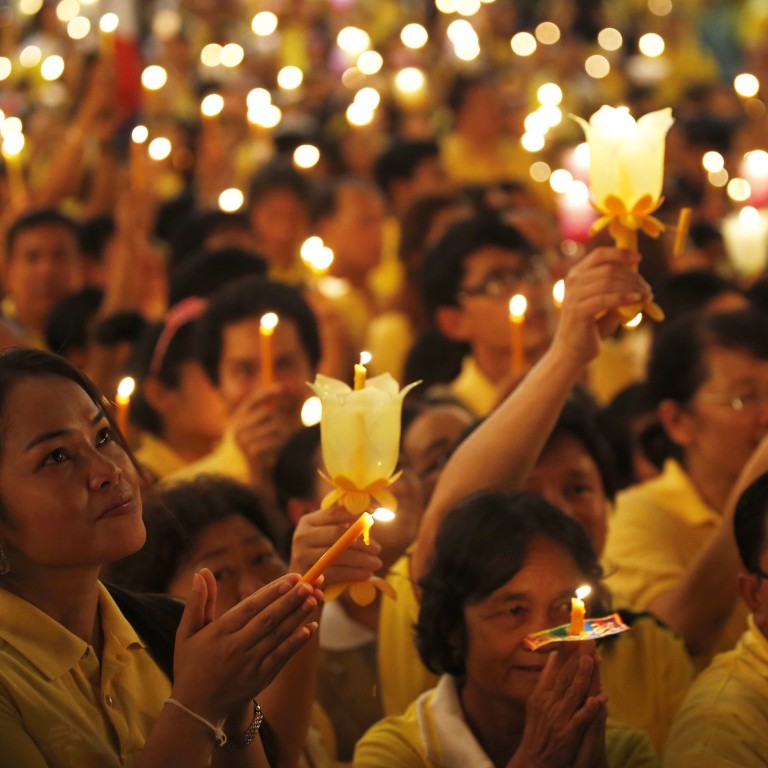
Thai monarchy facing the end of an era
Philip Bowring says the succession rumours sparked by the impending end of King Bhumibol's reign only highlight the institution's fading role as a force of stability in society
The case of China's disgraced security boss, Zhou Yongkang, bears marked similarities to that of the head of Thailand's police criminal investigation department, Pongpat Chayaphan. Lurid allegations of corruption and other crimes have been paraded through the media, an indication that there is an underlying political message as well as supposed proof that the government is cleaning up.
But while Zhou's case may be the final major act by President Xi Jinping to cleanse the uppermost echelons of those who are both corrupt and politically inconvenient, the Thai case may mark the start of an internecine struggle for position as the reign of King Bhumibol Adulyadej approaches its end. The politics of the palace and the struggle between those for and against populist ex-prime minister Thaksin Shinawatra have become ever more intertwined, with dangerous consequences, not least for the monarchy, an institution whose role is now becoming exposed to more public scrutiny. The popping of the bubble of sanctity created around it will be disturbing for all Thais.
The Thai monarchy is usually presented by the world's media as a rock of stability in a politically fractious society given to alternating military coups and democratic interludes. References to King Bhumibol are almost always prefaced in news reports by the adjective "revered".
But at least some of this received wisdom derives from an eagerness not to be accused of lèse-majesté, the wide-ranging law which can be used by any citizen against anyone seeming to have criticised members of the royal family. As a result, the institution has got away with an almost unparalleled absence of scrutiny, a remarkable achievement in a society which is otherwise very open.
Granted, any monarchy needs myths. "We must not let daylight in upon magic," noted Walter Bagehot discussing the monarchy's role. But a modicum of public respect is needed, especially if monarchs wish to be political arbiters rather than gilded figureheads.
A few days after the arrest of Pongpat, it was announced that the heir apparent to the throne, Prince Vajiralongkorn, had stripped his third wife, Princess Srirasmi, of her royal title. What was not reported locally or in the major English-language media was that the arrested police chief was an uncle of Srirasmi. That news first appeared on a Hong Kong-based website, though it was presumably known to other foreign media.
Pongpat is accused, among other things, of lèse-majesté for using his royal connection to acquire wealth. It was also widely believed that the police officer and the former princess had too-close links to Thaksin who, having been a colonel in the police, enjoyed strong support in the force. Hence, his enemies saw him in a position to use the succession as a stepping stone back to power. The junta and its elite friends could not stomach that.
Where all this leaves the prince, who spends much time in Germany and now has a new partner, remains to be seen. Removing Srirasmi, who was a long way socially from the Thai aristocracy, may give the prince more support with the military if there is any doubt that he should succeed the king, rather than his unmarried sister Princess Sirindhorn or a regent.
The disgrace of Srirasmi has anyway further undermined the standing of the monarchy, as a video believed to be of her with the prince at a party in various stages of undress, which has long had a very restricted circulation, has become more widely available. The net effect of the prince's behaviour has further damaged his reputation and that of the monarchy.
The episode is showing up that, in recent years, the monarchy has arguably been a destabilising force even as the myths surrounding it have multiplied. The fact is that, for 40 years after it was driven from power by the 1932 modernist revolution, the monarchy was at best a useful decoration for the successive regimes of military strongmen. It was only after a democratic revolution in 1973 that the king began to be a force in politics and then mainly by close association with the military, giving consent to subsequent coups against elected governments but always careful to give an impression of being a wise and calming influence.
Even the appearance of such a stabilising role has disappeared since the overthrow of Thaksin in 2006. King Bhumibol has been silent as a mediator through two subsequent coups overthrowing elected pro-Thaksin governments. Meanwhile, the ever more overt role of the monarchy's surrogates in the political contest has undermined what was left of its role as a national institution representative of all Thai people.
The king still commands respect because of age and decades of image-building by a figure who, in his younger days, was a jazz musician and sailor, but has long been remote other than for the formal photos almost as conspicuous as those of Mao Zedong in pre-1975 China or the shah in pre-1978 Iran. But, meanwhile, the institution has been rotting from the inside. Monarchies can be useful things. But as those, most recently, of Iran and Nepal remind us, democracy, not autocracy, is their best defence. Ask the Swedes or the Brits.

